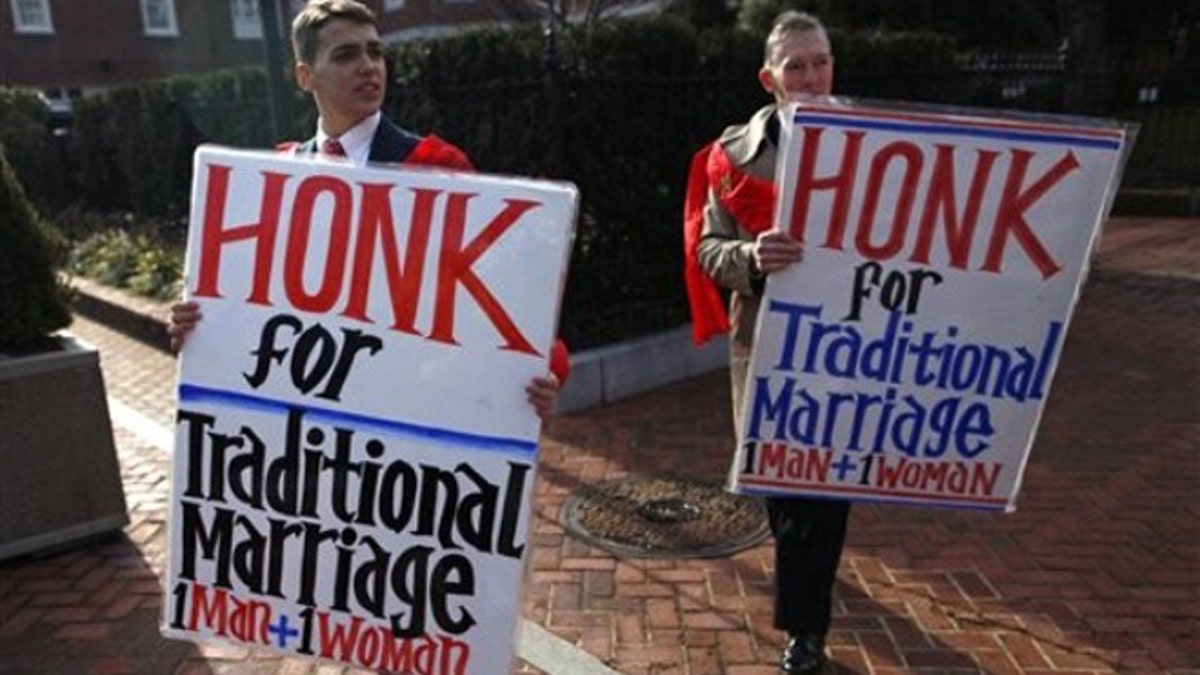
Feb. 17, 2012: Protesters demonstrate against a gay marriage bill before the Maryland State House in Annapolis, Md. (AP)
As the debate over gay marriage intensifies on the heels of President Obama's endorsement, an under-the-radar case pending before the Supreme Court has the potential, some say, to invalidate traditional marriage laws altogether.
The latest ruling comes from the California-based 9th Circuit Court of Appeals, which said that Arizona's recent attempt to strip health benefits for domestic partners of state workers is illegal.
Arizona moved in 2009 to take away the recently expanded benefit as part of an attempt to partially plug a $1.6 billion budget hole. Some gay workers countered that the savings were minimal -- no more than $2 million, according to one expert -- and that the law really targeted them. So they challenged it in court. And the court agreed.
But one veteran 9th Circuit judge thinks his colleagues have declared a war on marriage.
Those judges "all but expressly held that opposite-sex-only marriage rules are unconstitutional -- indeed, that such rules are irrational per se because they can rest only on a 'bare desire to harm a politically unpopular group,'" Judge Diarmuid O'Scannlain wrote in dissent of his court's decision not to grant the case further review. He said his colleagues were ignoring Supreme Court precedent and all but called upon the high court to take the case. Arizona's attorney general recently filed a brief with the justices asking them to accept O'Scannlain's invitation.
Lawyer John Eastman, with the National Organization for Marriage, called the 9th Circuit ruling "groundbreaking," and one that could render traditional marriage laws across the country "unconstitutional" if it takes hold.
Those challenging the Arizona decision, though, called the state's actions discriminatory.
"The legislature took aim at that system and dismantled it wholesale," lawyer Tara Borelli told Fox News. "There was nothing accidental or inadvertent about this. The legislature knew exactly what it was doing. And that's what's required to show that something is discriminatory."
A trial court judge agreed and so did a three-judge panel of the 9th Circuit on appellate review. Arizona officials then asked for another chance to make its case before the 9th Circuit, but that was denied without comment, prompting O'Scannlain's blistering dissent.
Keith Humphrey, an administrator at the University of Arizona in Tucson, said he was excited to learn that his partner, Robert, could be added to his employer-sponsored health plan. Then a year later, the state tried to take it away.
"I felt very disappointed when the state said my employment is worth less than someone who is married," Humphrey told Fox News. The couple has three kids and until the change in law, Robert, who stays at home with the children, was on the state's Medicaid roll. The pair still receives health benefits under Humphrey's plan because the courts have put a hold on the benefit revocation.
Those defending the legislature's action say there was no intent to discriminate against Humphrey, his partner or anyone else. It was simply a budgetary decision with no hidden ulterior motive. Further, they note the law's provision removing benefits for domestic partners is very broad.
"In 2008 they expanded (dependent health coverage) to include any other person who had a domestic financial relationship with someone they'd been living with for 12 months," Eastman observed. "That could be same-sex couples. It could be opposite-sex couples who are unmarried. It could even be roommates who had shared a checking account and rent expenses for 12 months."
An outside expert provided testimony that only a fraction -- as little as 7 percent -- of the domestic partners actually receiving state benefits were of the same sex and cost Arizona no more than one-quarter of 1 percent of the state's health care costs.
But the legal issue for Borelli and her clients isn't about a budgetary squeeze or statistics. "The fact that the state of Arizona may have wanted to save some negligible amount of money by cutting out this very small percent of the population, doesn't excuse the discrimination," she said. She points out that opposite-sex partners can still obtain health benefits from the state if they get married -- an option that's foreclosed for gay workers.
"It's as if the state were saying to same-sex couples, 'you can have access to this health insurance as long as you do this thing that is legally impossible for you to do.' Well that's not equal treatment, and everybody can see that," she said.
A major legal question is whether Arizona lawmakers had a rational basis to remove the benefit. O'Scannlain's assessment of what his colleagues decided makes clear his view of the case. "The panel concluded -- in a way that is veiled but unmistakable -- that rules benefiting only traditional marriage serve no conceivable rational purpose." He said that determination prevents Arizona voters -- and those in other states -- from passing laws that protect traditional marriage.
Eastland says the legislature's action was perfectly reasonable given the budgetary fix it was in and that courts are supposed to defer to elected lawmakers to make difficult decisions -- like what programs or benefits to cut when money is tight. "The 9th Circuit has now effectively gone on record as saying it's irrational for the state to provide benefits to traditional married couples that it doesn't extend to everybody else. And that the only explanation for it is bigotry toward homosexuality."
The Supreme Court is unlikely to decide whether to take the case until the fall. This case is different from another 9th Circuit ruling that invalidated the controversial Prop 8 referendum in California banning same-sex marriage. A third high-profile case over the federal Defense of Marriage Act is also expected to reach the Supreme Court. The justices could agree to hear and decide all, some or none of these cases.




